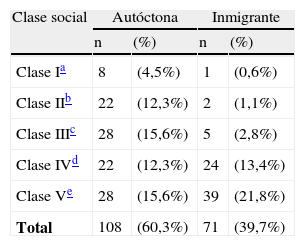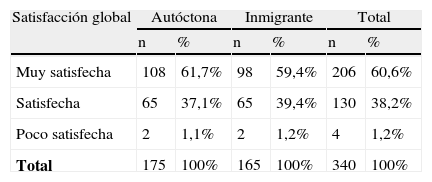Describir el nivel de satisfacción de las mujeres que acuden al Complejo Hospitalario Universitario de Albacete (CHUA), con respecto a la asistencia recibida durante su ingreso para la atención al parto y puerperio inmediato, así como evaluar las variables sociodemográficas que influyen en la satisfacción de las usuarias del servicio de paritorio del CHUA.
MétodoEstudio descriptivo, transversal y comparativo mediante una entrevista que recoge variables sociodemográficas y gineco-obstétricas y un cuestionario de satisfacción, a las puérperas del CHUA, hospital de referencia de Área de Salud Albacete, en el servicio de Obstetricia. La selección se lleva a cabo mediante un muestreo sistematizado, en el cual se recogen a todas las inmigrantes y la autóctona inmediatamente anterior en el libro de partos, según criterios de inclusión.
ResultadosEncontramos que las mujeres autóctonas realizan un correcto control integral del embarazo en el 92,1% (164) de los casos frente al 63,4% (109) de las inmigrantes (χ2=42,172; gl=1; p=0,000). El 87,5% (287) del total de satisfechas piensan que el interés de la matrona es mejor o mucho mejor de lo que se esperaban (χ2=102,466; gl=4; p=0,000). El 95,81% (320) de las mujeres satisfechas recomendarían el hospital, mientras que el total de las no satisfechas tienen dudas (χ2=93,680; gl=2; p=0,000).
ConclusionesLas variables sociodemográficas no influyen en la satisfacción global de las mujeres, exceptuando la edad. En general tanto las mujeres autóctonas como inmigrantes se encuentran satisfechas con la atención recibida en el área de partos del CHUA.
To describe the level of satisfaction of women who come to the University Hospital of Albacete (CHUA), as regards the health carereceived upon admission for giving birth and during the immediate postnatal period, and to evaluate if the socio-demographic variable has an influence on user satisfaction of the delivery room service.
MethodDescriptive and cross-sectional study carried out through an interview in order to obtain data on the socio-demographic, obstetric and gynaecological variables, together with a satisfaction questionnaire for women in the puerperium period at the CHUA, reference hospital of the Health Area in Albacete, in the Obstetrics Service. The selection was made by systematic sampling, in which immigrants and Spanish born women were enrolled according to the inclusion criteria.
ResultsWe found that 92.1% (164) of Spanish-born women carry out a proper integral control of pregnancy, compared to 63.4% (109) of immigrants (χ2=42.172; gl=1; P=.000). The majority (87.5%, 287) of the total number of satisfied women thought that the midwife interest was better or much better than they expected (χ2=102.466; gl=4; P=.000). The large majority of satisfied women (95.81%, 320) would recommend the hospital, while the number of unsatisfied women had doubts (χ2=93.680; gl=2; P=.000).
ConclusionsThe socio-demographic variables did not appear to have an influence on the overall satisfaction of the women, except for the age. In general, both the autochthonous and immigrant women were satisfied with the attention received in the CHUA Delivery room.
Artículo
Comprando el artículo el PDF del mismo podrá ser descargado
Precio 19,34 €
Comprar ahora










